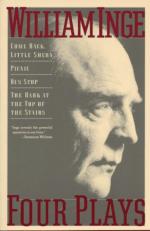|
This section contains 1,497 words (approx. 5 pages at 300 words per page) |

|
Until the appearance of A Loss of Roses (1959), Inge had a reputation as a playwright whose work did not fail. Following the modest success of Come Back, Little Sheba (1950), Inge's next three plays, Picnic (1953), Bus Stop (1955), and The Dark at the Top of the Stairs (1957), established him as one of Broadway's most successful playwrights; because of our strange belief in the corollary relationship between income and reputation, Inge also came to be accepted as one of America's leading dramatists. His own ambiguous sense of his position is made clear in the Foreword to 4 Plays in which he dwells on his longing for both big success ("but none of them has brought me the kind of joy, the hilarity, I had craved as a boy") and artistic success, a feeling of having contributed something to the theater.
If the self-image that Inge projects in that Foreword—the playwright who...
|
This section contains 1,497 words (approx. 5 pages at 300 words per page) |

|


